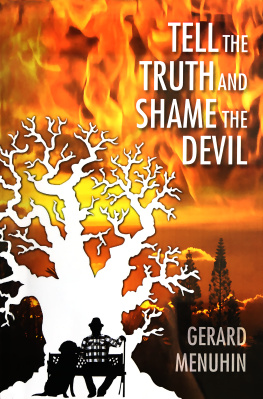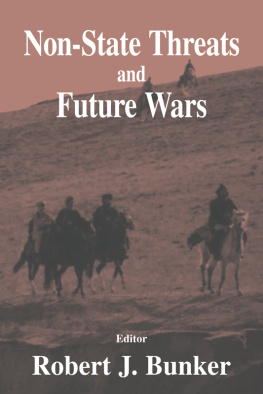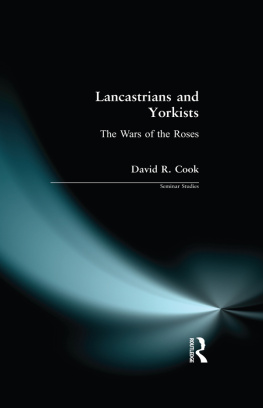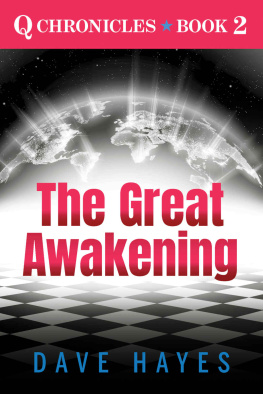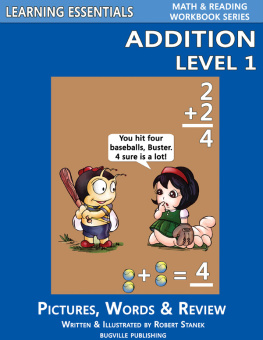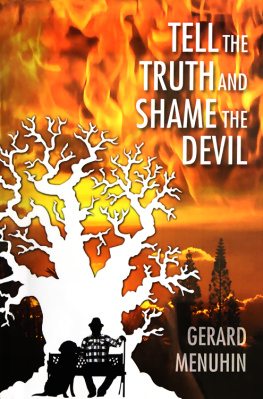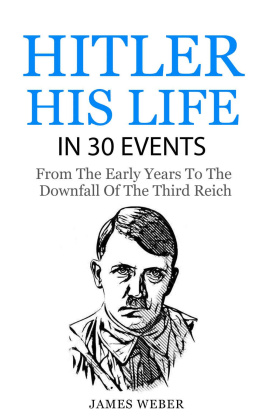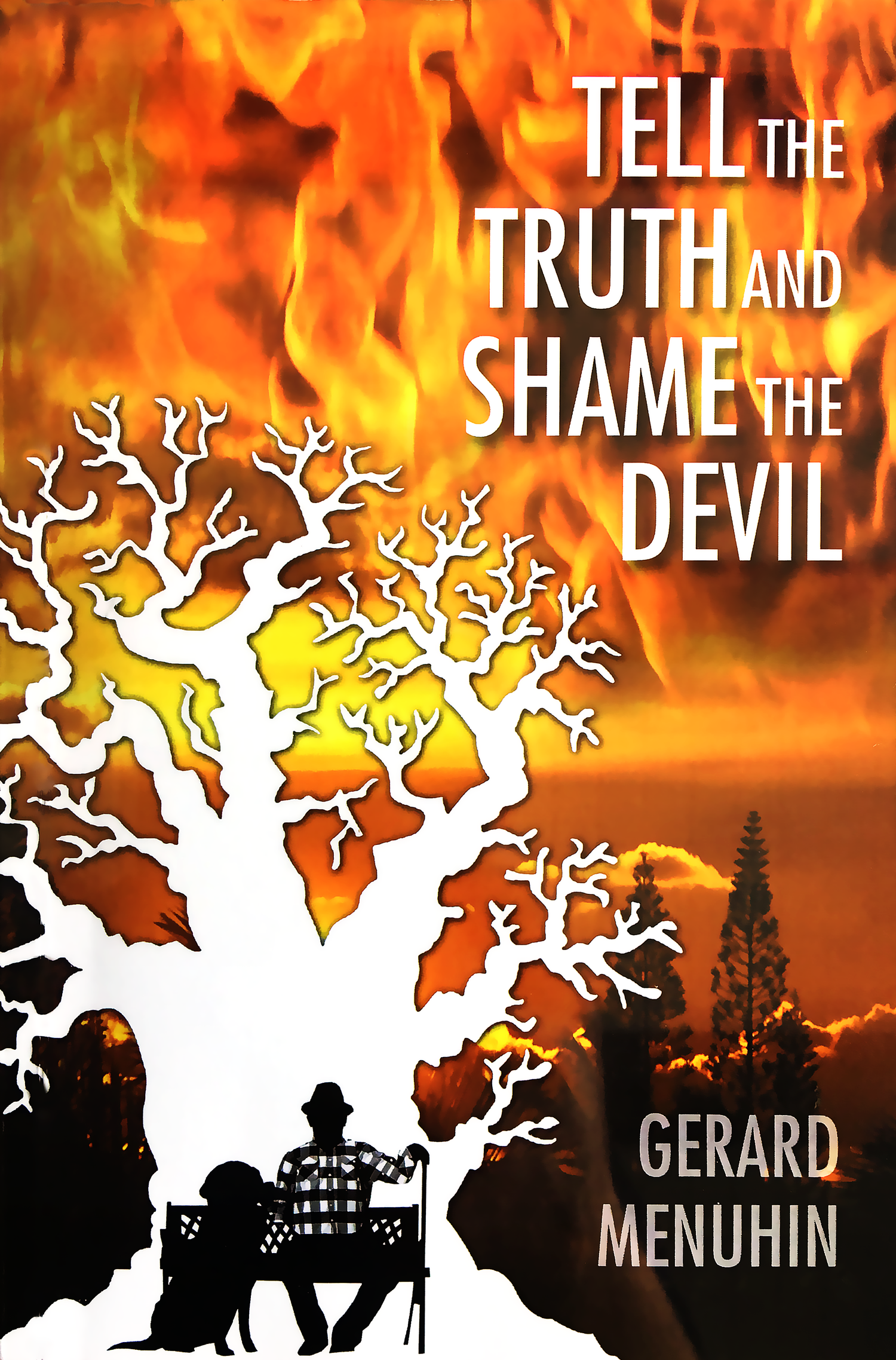Tell the
Truth &
Shame the
Devil
As told to the author
by a little old man
in a plaid shirt
D EDICATION :
For Germany.
For Germans who still
want to be German.
For Humanity.
Tell the
Truth &
Shame the
Devil
As told to the author
by a little old man
in a plaid shirt
By Gerard Menuhin
Published by The Barnes Review 2015
Sorrow is knowledge;
they who know the most,
must mourn the deepest
oer the fatal truth,
the Tree of Knowledge
is not that of Life.
Byron , Manfred
I
THWARTED: HUMANITYS LAST GRASP FOR FREEDOM
T his dog is a Labrador. Seldom barks and is good-natured, like most Labradors. Now and then, I join its owner for one of his daily rounds to air the animal. Hes a Jehovahs Witness. Initially, he did his duty by trying to convert me, but I told him that I dont believe in anything I cant see, so he gave up. If I needed to worship anything, it would be trees. Trees have this in common with a folk culture and a manufacturing economy: both are rooted in the ground and so are stable. A seasonal or service economy, supplying a may-fly community of consumers, is unstable. Any tree is worth countless consumers, as they rarely provide anything beneficial. What they can and often do is to destroy trees. It takes a subhuman with a chainsaw only seconds to cut down what has taken maybe hundreds of years to grow. Picture an oak. This admirable tree stands on a hill and affords a majestic view. Its furrowed trunk towers into the sky. It has seen more seasons than any person. It has withstood countless winter storms. Its presence is ennobling even when leafless. It doesnt have to do anything, it just is. Then along comes a consumer (an organism that obtains what it craves by helping itself to other organisms ) with a saw and cuts it down for boards or even for firewood. Which would you rather have, the organism or the oak?
Leading on from the consumer, dont speak to me about the dignity of man. I havent seen a dignified human for a long time, if ever. That is because dignity implies personal responsibility. The Dignity of Man is just like the Rights of Man, an artificial concept, invented by artificial, cosmopolitical bodies like the U.N. or the Court of Human Rights, to displace national laws; intangible claptrap intended to usurp established rights. Based on the fraudulent Dclaration des Droits de lHomme of 1789, they exalted the empty excitations Libert, Fraternit, Egalit. If the right to clean air and water is not guaranteed, and to freedom of speech and assembly, of what use are these sonorous declarations?
My neighbour and I agree on many topics, except that, like most sectarians, Jehovahs Witnesses believe Christ will return to save them. I expound on the degradation of everything and he responds with quotes from the Scriptures, which I check when I get home. He is always right. I name the guilty; he calls them Satan. The Bible did in fact foresee it all: John 8:44, or, if you prefer, Revelation 2:9. So were both right.
I suppose it began with a sense, nothing more. Not even a vague sentiment, let alone the certitude that what the average child is taught about major historical events is a pack of lies. It was just a lurking mental itch. My father never spoke of the war, any more than he spoke of anything negative or disagreeable or, indeed, about the past at all, if he could help it. My mother spoke mostly about the past. Her past. But also, if the mood took her, of the superiority of Edw a rdian (stressed a) architecture over the Victorian equivalent, of her superior sense of dress and decoration, or of her war experiences. She maintained the convictions of her generation, among them, that Churchill had been a great man and Neville Chamberlain, a gullible one (appeasement may never shed its tarnish, although any attempt to prevent war must be commendable). Although she would lugubriously tell my brother and me that you (note, not we) would have been gassed if you had lived in Germany, she was in no sense Germanophobic, she even spoke some German. Of course, Germany had not been part of her past, so it was not included in the reminiscences that formed a large part of her conversation. I have never met anyone whose opinions were so wholeheartedly based on bygone criteria as my mother, or who so resolutely rejected any influence for change. She suffered the present, but judged it always through the filter of her past, however irrelevant.
Until my late teens, my impressions of the war had been almost entirely derived from the pictorial adventures of heroic Allied servicemen, known as trash at school (inspired by these, I was a prolific doodler of battleships and planes). As the captive audience of my mothers recollections of the Blitz, I habitually tuned out or deleted most of her repetitive anecdotes, out of resentment. I regret this now, as a clearer firsthand account of life in wartime London, however edited, would have been informative. But the very manner of my mothers monologues hindered questions, which would have been considered mere interruptions of the scheduled broadcast.
Associated topics included the Wirtschaftswunder years, the miracle of postwar German industrial reconstruction, to which my mother alluded during my parents few visits to my German school, in 1957. At nine, I was unsurprisingly unaware of this phenomenon, or of the incongruity of two advanced Anglo-Saxon nations destroying each other. About fifteen years later, I heard an irascible colonel on American radio voice a fitting verdict: For the British and the Germans to be fighting each other was an inappropriate encounter situation. All the Germans I knew were unfailingly pleasant and remarkable only for seeming each to possess the same model of shiny dark blue suit, in retrospect perhaps in itself an indication of their striving towards a return to bourgeois standards. The schoolchildren at Hermannsberg were also models of normality, in that, in their free time, they were chiefly occupied with games/sports, amusement, music and outdoor pastimes. That their ancestors and mine could have been incited to kill each other never occurred to me. The only reference to the war that I remember is of a glancing remark I overheard as I was drying myself after the morning shower, when two older boys were exchanging hearsay about the fate of German POWs in Russian captivity. Although it was typical of schoolboys gossip, the morbid subject naturally impressed me at the time.
Since then, I have learnt much, some of it by reflection, some from books and records of and about the time, which by their copious footnotes and corroborative contents and cross-referencing, confirm that the sympathy I have always felt for this much-maligned and mistreated people is justified. In fact, I never gave the subject much thought, occupied as I was with my daily drudgery, until the Nineties, when, while I was ordering the contents of my deceased grandparents house, I chanced on a copy of the National Zeitung, the patriotic German newspaper to which my grandfather had contributed a column for several years during the Sixties. He had devoted his life, by means of books and articles, to supporting the Palestinians, among whom he had lived as a boy, during the first decade of the twentieth century. A Russian-Jewish immigrant, he had experienced much kindness from the local Arabs and had taken stock of the attitude and expectations of some of the Jewish settlers.
The newspaper commanded respect, with its simple Maltese/Iron Cross logo and boldly independent informative stance. Although it entered my thoughts only intermittently, my ambition to communicate with its publisher and friend of my grandfathers grew over the years, in measure as I was subjected to various revelations. No mission to discover a universal truth inspired me, rather a wish to understand my times and the development of the world, in particular to explain to myself this catastrophic caesura during the 1940s, a warp not only in time, but in Western European character, during which the fathers and grandfathers of my German classmates had allegedly done the unspeakable. So hideous and shameful had been their crimes then that they had even acquired their own appellation. By inducing a particular bias into a hitherto neutral English word, a commodious new orthodoxy was invented, so powerful that its regular, ubiquitous invocation by the media had placed the entire Western world under its spell. How could this be?

